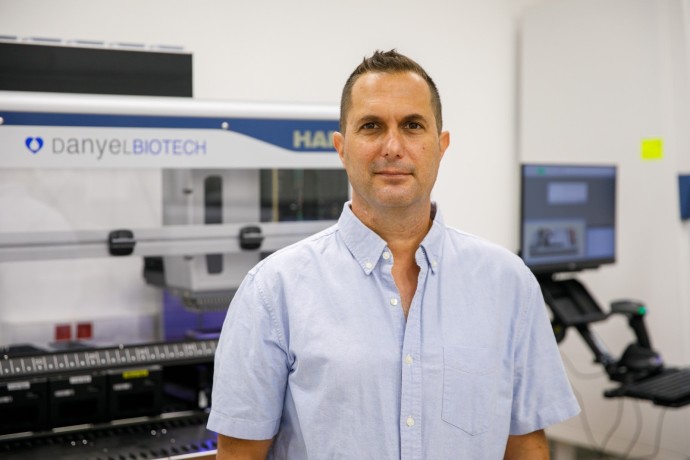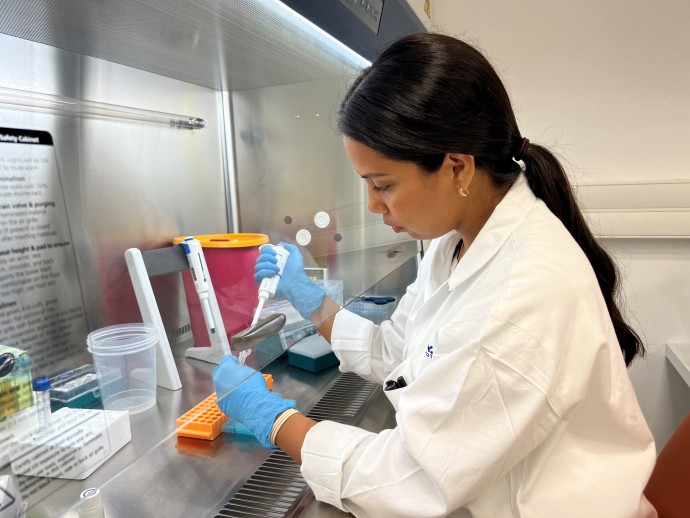Antibiotic-resistant bacteria are responsible for the deaths of some 700,000 people each year, including 6,000 Israelis – with scientists predicting that these infections could kill more people than cancer by 2050.
“Antimicrobial resistance, AMR, is like climate change. We need to act now so our children can have a world to live in. In 10 to 30 years, the situation with antibiotics will be a total disaster, and not enough people are talking about it,” said Dr. Nadav Sorek, head of Samson Assuta Ashdod Hospital’s new emerging infectious disease center and clinical microbiology lab.
The lab, the result of an anonymous $1 million gift toward the start of the COVID-19 pandemic, has become one of the country’s most innovative laboratories. Sorek and his team are on a mission to develop the surveillance and treatment technologies vital for preventing, identifying and controlling the spread of infectious diseases.

AMR – though not as sexy as COVID or monkeypox, which the lab is also working on – is at the top of the lab’s list of priorities. That’s because of the lack of new antibacterial treatments being developed while people continue to die.
Earlier this summer, the World Health Organization in its annual pipeline report, which assesses those antibacterial drugs in preclinical and clinical development, described the pipeline as “stagnant” and “far from meeting global needs.”
This is in part because of the lengthy pathway to approval of antibiotics that drug companies must undergo due to the excessive cost and low success rates.
“Pharma is not succeeding in finding new antibiotics,” Sorek explained. “There are some alternative treatments being explored, options for combination antibiotics, but what we really need is to understand much better the mechanism of antibiotic resistance and infection by ‘superbugs’ so we can prevent it.”
He said that it is difficult to know where a patient is infected by resistant bacteria. His lab analyzes the bacteria to get clues.

New tools and technology
It all began during COVID-19, the global pandemic that has killed more than 6 million people over the past two-and-a-half years. Today, most people are familiar with what it means to take a PCR test and laboratories are generally equipped – at least in Western countries – to receive PCR results and develop them quickly and accurately.
In the beginning of the pandemic, it was very hard to know if the PCR diagnostic was being done correctly, Sorek explained.
'Together, we are looking to do genetic analysis to try to define specific genes that are involved in Alzheimer'
Dr. Nadav Sorek
COVID raised a red flag to the medical community about the need to focus more on diagnostics, being able to quickly identify a new bacteria, virus, fungi or parasite, he said. At Assuta Ashdod, the new lab took this a step forward, tying a sophisticated research arm to the diagnostic arm.
Now, because of new genetic tools and technology, the lab is able to name unidentified diseases and track how they spread in order to stop infection.
New research aims to prevent Alzheimer’s
The lab has gained national recognition and recently sparked a collaboration with Ben-Gurion University of the Negev (BGU), moving its research beyond infectious diseases to other areas.
One such collaboration centers on Alzheimer’s disease, in which the hospital’s Neurology Department sends blood samples from Alzheimer’s patients to the lab. There, they undergo a first round of genetic analysis and are stripped of any personal information.
The samples are then transferred to BGU where researchers further evaluate them to try to determine if there is a genetic market for the development of Alzheimer’s.
“Right now, Alzheimer’s diagnosis is based on cognitive tests and some imaging. You cannot take a blood test and determine if a person has or is going to have Alzheimer’s,” Sorek said. “Together, we are looking to do genetic analysis to try to define specific genes that are involved in Alzheimer’s.”
If it works, he said, the result would be much earlier identification of the disease, prevention and, of course, treatment.
